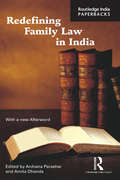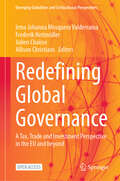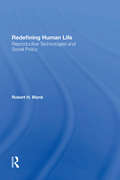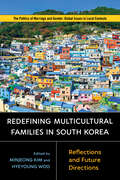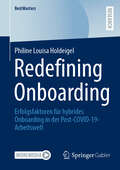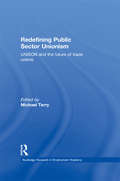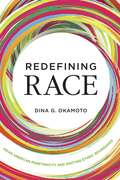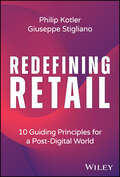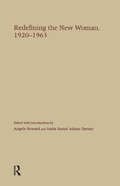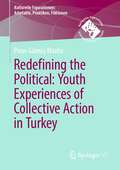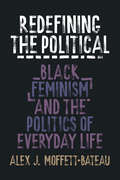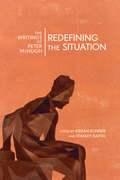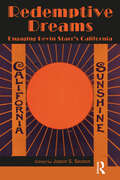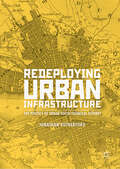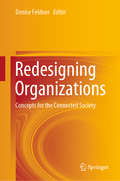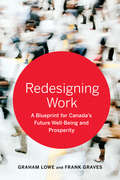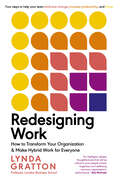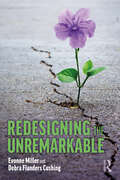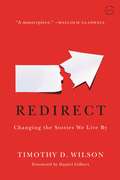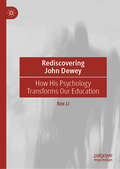- Table View
- List View
Redefining Family Law in India
by Archana ParasharThis volume is a collection of articles by scholars across disciplines to create a discourse of family law independent of Religious Personal Law, whilst striving for fairness and justice to all. It demonstrates the artificiality of the public–private divide and seeks the systematic development of ideas for a fair and just family law in contemporary India.The book does not merely document the pathologies of power within the family but also makes proposals for remedying these inequities. It is not confined to considering what changes need to be inducted into existing family law to make it more just, but also strategises on the means and methods of effecting the change. It lifts the familial veil and scrutinises the status, rights and disabilities of some of the subordinated members of the family. The volume is an invitation to redefine family law with the twin tools of reflection and responsibility.It will interest those in law judges, legislators, law reformers as well as those in women and family studies, policy makers and policy analysts, apart from the general reader.
Redefining Global Governance: A Tax, Trade and Investment Perspective in the EU and beyond (Emerging Globalities and Civilizational Perspectives)
by Julien Chaisse Irma Johanna Mosquera Valderrama Allison Christians Frederik HeitmüllerThis open access volume offers a unique interdisciplinary analysis of the current structure of global governance on tax, trade, and investment. It explores the interplay between actors, critiques current norm-making procedures, and proposes concrete solutions for improvement. It considers the impact of global governance in local contexts in Asia, Europe, and Africa, and includes perspectives from scholars based in these continents. It takes a comparative approach that goes beyond a siloed perspective to undertaking comparisons between the ways in which similar problems have been addressed in different areas---making the contributions highly relevant to scholars and policymakers worldwide. The volume includes case studies and provides concrete suggestions for improving global governance of tax, trade, and investment. This highly topical open access volume is of interest to a global readership in the fields of international law and taxation, globalization, international relations, and international trade economics.
Redefining Human Life: Reproductive Technologies And Social Policy
by Robert H BlankThis book examines critical social-policy issues emerging from recent developments in human reproductive technology. Although considerable attention has been focused on the ethical dimensions of these developments, the policy dimension has largely been obscured.Dr. Blank now provides a far-ranging overview of the cumulative impact on society of a wide array of new reproductive technologies and the social patterns that accompany or precede their application.The book begins with a description of the current context of reproductive decision making. Dr. Blank demonstrates how emerging technologies are producing complex and intense social-policy concerns,then reviews in detail human reproductive technologies, and illustrates the significant consequences of technological innovations for political and legal concepts of rights and obligations. (Examples include recent cases involving torts for wrongful life.) He analyzes possible alterations in the moral and legal status of the fetus in light of apparent technological and social-policy trends and presents a paradigm of fetal rights that reflects these changes. A final case is made for a comprehensive assessment of reproductive technologies, as well as for the urgent need to refine concepts of human life that in the past have been taken for granted, but that now are being challenged.
Redefining Multicultural Families in South Korea: Reflections and Future Directions (Politics of Marriage and Gender: Global Issues in Local Contexts)
by Ilju Kim Julie S Kim YoonKyung Kwak Hyun Mee Kim Yu Seon Yu Sohoon Yi Nora-Hui-Jung Kim Hsin-Chieh Chang Minjung Kim Harris Hyun-soo Kim Lindsey Wilkinson Wonjeong Jeong Sojung LimRedefining Multicultural Families in South Korea provides an in-depth look at the lives of families in Korea that include immigrants. Ten original chapters in this volume, written by scholars in multiple social science disciplines and covering different methodological approaches, aim to reinvigorate contemporary discussions about these multicultural families. Specially, the volume expands the scope of “multicultural families” by examining the diverse configurations of families with immigrants who crossed the Korean border during and after the 1990s, such as the families of undocumented migrant workers, divorced marriage immigrants, and the families of Korean women with Muslim immigrant husbands. Second, instead of looking at immigrants as newcomers, the volume takes a discursive turn, viewing them as settlers or first-generation immigrants in Korea whose post-migration lives have evolved and whose membership in Korean society has matured, by examining immigrants’ identities, need for political representation, their fights through the court system, and the aspirations of second-generation immigrants.
Redefining Onboarding: Erfolgsfaktoren für hybrides Onboarding in der Post-COVID-19-Arbeitswelt (BestMasters)
by Philine Louisa HoldeigelDer Übergang zu hybriden Arbeitsumgebungen aufgrund der Digitalisierung und der COVID-19- Pandemie führt zu Herausforderungen beim Onboarding neuer Mitarbeiter. Das veränderte Arbeitsumfeld nach Ende der Pandemie sowie der War for Talents verlangen von Unternehmen die Anpassung bestehender Prozesse, um neue Mitarbeiter ab Unternehmenseintritt erfolgreich und langfristig zu binden. Die Autorin identifiziert Herausforderungen und Erfolgsfaktoren für hybrides Onboarding von Wissensarbeitern, um Anpassungen des Onboardings an den hybriden Onboardingkontext zu optimieren. Die Ergebnisse von Experteninterviews deuten darauf hin, dass sich Erfolgsfaktoren für hybrides Onboarding in fünf Bereiche strukturieren lassen, die sich in der Literatur wiederfinden: Compliance, Clarification, Culture, Connection und Process. Dabei sind speziell für den hybriden Onboardingkontext die Herausforderungen Technik und soziale Distanz gültig und folglich diejenigen Faktoren für das hybride Onboarding relevant, welche die Herausforderungen bewältigen: Den persönlichen Kontakt vor Ort nutzen, digitale Lösungen, insbesondere für die fachliche Einarbeitung integrieren und die Kombination der Arbeitsorte flexibel einsetzen. Die Arbeit attestiert dynamische Weiterentwicklungen für hybrides Onboarding in der Zukunft.
Redefining Public Sector Unionism: UNISON and the Future of Trade Unions (Routledge Research in Employment Relations)
by Michael TerryThis book brings together contributions from both expert academics and leading figures of UNISON in an in-depth analysis of the union's achievements to date. As the largest and most influential trade union in the public sector, UNISON is an ideal case-study for the possible future development of UK unions in the twenty first century.
Redefining Race: Asian American Panethnicity and Shifting Ethnic Boundaries
by Dina G. OkamotoIn 2012, the Pew Research Center issued a report that named Asian Americans as the “highest-income, best-educated, and fastest-growing racial group in the United States.” Despite this seemingly optimistic conclusion, over thirty Asian American advocacy groups challenged the findings. As many pointed out, the term “Asian American” itself is complicated. It currently denotes a wide range of ethnicities, national origins, and languages, and encompasses a number of significant economic and social disparities. In Redefining Race, sociologist Dina G. Okamoto traces the complex evolution of this racial designation to show how the use of “Asian American” as a panethnic label and identity has been a deliberate social achievement negotiated by members of this group themselves, rather than an organic and inevitable process. Drawing on original research and a series of interviews, Okamoto investigates how different Asian ethnic groups in the U.S. were able to create a collective identity in the wake of the Civil Rights movement in the 1960s. Okamoto argues that a variety of broad social forces created the conditions for this developing panethnic identity. Racial segregation, for example, shaped how Asian immigrants of different national origins were distributed in similar occupations and industries. This segregation of Asians within local labor markets produced a shared experience of racial discrimination, which encouraged Asian ethnic groups to develop shared interests and identities. By constructing a panethnic label and identity, ethnic group members took part in creating their own collective histories, and in the process challenged and redefined current notions of race. The emergence of a panethnic racial identity also depended, somewhat paradoxically, on different groups organizing along distinct ethnic lines in order to gain recognition and rights from the larger society. According to Okamoto, these ethnic organizations provided the foundation necessary to build solidarity within different Asian-origin communities. Leaders and community members who created inclusive narratives and advocated policies that benefited groups beyond their own were then able to move these discrete ethnic organizations toward a panethnic model. For example, a number of ethnic-specific organizations in San Francisco expanded their services and programs to include other ethnic group members after their original constituencies dwindled. A Laotian organization included refugees from different parts of Asia, a Japanese organization began to advocate for South Asian populations, and a Chinese organization opened its doors to Filipinos and Vietnamese. As Okamoto argues, the process of building ties between ethnic communities while also recognizing ethnic diversity is the hallmark of panethnicity. Redefining Race is a groundbreaking analysis of the processes through which group boundaries are drawn and contested. In mapping the genesis of a panethnic Asian American identity, Okamoto illustrates the ways in which concepts of race continue to shape how ethnic and immigrant groups view themselves and organize for representation in the public arena.
Redefining Retail: 10 Guiding Principles for a Post-Digital World
by Philip Kotler Giuseppe StiglianoDiscover the new realities of working in the post-digital era of consumer brand and retail marketing. In Redefining Retail: 10 Guiding Principles for a Post-Digital World, renowned international marketers Prof. Philip Kotler and Dr. Giuseppe Stigliano deliver a timely and insightful examination of retail and consumer brand marketing. In the book, you’ll find practical and concrete techniques for redefining your organisation’s internal operations and processes, as well as its business strategy. You’ll rethink the entire value chain as you consider the growing importance of sustainability, diversity and inclusion, working policies, and more. The authors describe ten critical principles that should guide the actions of your company, whether you work with a startup, an SME, or a large, established organization. They also discuss: The main challenges retailers face in a world that’s been fundamentally transformed by the digital revolution. How to future-proof your marketing strategy, including 10 guiding principles for a new customer experience at retailers and consumer brands. The opportunities and threats of creating a seamless customer journey in the physical, digital, and virtual realms. Perfect for managers, entrepreneurs, consultants, and investors in both the B2B and B2C sectors, Redefining Retail: 10 Guiding Principles for a Post-Digital World will also prove invaluable to students of management, marketing and business administration, as well as anyone with an interest in the evolution of commerce.
Redefining School Safety and Policing: A Transformative Four-Pillar Model
by Jeffrey D. YarbroughRedefining School Safety and Policing identifies and works to eliminate systemic issues in school policing that negatively impact students of color, LGBTQIA+ students, and other marginalized populations. Focusing on the fundamental goal of creating safe learning environments, Yarbrough lays out the unintended consequences of involving police in the administrative disciplinary process, as agents of school administrators and enforcers of zero-tolerance policies. Behavioral health support is important to students going through social, emotional, and mental health crises. True equity work brings everyone to a safe space in the middle, encouraging open discussion and courageous dialogue and aiming to create positive change. Yarbrough argues that behavioral health and racial equity are vital to transforming school policing and providing beneficial alternative solutions to school policing that do not lead students to the juvenile or criminal justice system. This book is suitable for colleges and universities, K-12 school administrators, teachers, police and school resource officers, counselors, social workers, and community activists.
Redefining Success in America: A New Theory of Happiness and Human Development
by Michael KaufmanWork hard in school, graduate from a top college, establish a high-paying professional career, enjoy the long-lasting reward of happiness. This is the American Dream—and yet basic questions at the heart of this competitive journey remain unanswered. Does competitive success, even rarified entry into the Ivy League and the top one percent of earners in America, deliver on its promise? Does realizing the American Dream deliver a good life? In Redefining Success in America, psychologist and human development scholar Michael Kaufman develops a fundamentally new understanding of how elite undergraduate educations and careers play out in lives, and of what shapes happiness among the prizewinners in America. In so doing, he exposes the myth at the heart of the American Dream. Returning to the legendary Harvard Student Study of undergraduates from the 1960s and interviewing participants almost fifty years later, Kaufman shows that formative experiences in family, school, and community largely shape a future adult’s worldview and well-being by late adolescence, and that fundamental change in adulthood, when it occurs, is shaped by adult family experiences, not by ever-greater competitive success. Published research on general samples shows that these patterns, and the book’s findings generally, are broadly applicable to demographically varied populations in the United States. Leveraging biography-length clinical interviews and quantitative evidence unmatched even by earlier landmark studies of human development, Redefining Success in America redefines the conversation about the nature and origins of happiness, and about how adults develop. This longitudinal study pioneers a new paradigm in happiness research, developmental science, and personality psychology that will appeal to scholars and students in the social sciences, psychotherapy professionals, and serious readers navigating the competitive journey.
Redefining Well-Being in Nations and Organizations: A Process of Active Committed Enthusiasm
by Ali Qassim Jawad William Scott-JacksonRedefining Well-Being in Nations and Organizations.
Redefining Well-Being in Nations and Organizations: A Process of Improvement
by William Scott-Jackson Ali Qassim JawadRedefining Well-Being in Nations and Organizations is an essential book for researchers, policy makers and managers. It provides a new multi-disciplinary perspective on wellbeing and engagement, reviewing the latest research from several previously unrelated disciplines to develop a process for active committed enthusiasm (PACE), encompassing theory and clarifying the definitions of, and relationships between, wellbeing, engagement and related concepts. PACE allows researchers to model causal relationships, and policy makers and managers to analyze the potential impact of possible interventions. It demonstrates that, as nations, organizations and individuals fulfil their basic material needs, the impact of individual optimism, and other aspects of positive psychology, become paramount in maximizing wellbeing and engagement.
Redefining the New Woman, 1920-1963 (Antifeminism in America: A Collection of Readings from the Literature of the Opponents to U.S. Feminism, 1848 to the Present #2)
by Angela Howard and Sasha Ranaé Adams Tarrant2. Redefining the New Woman, 1920-1963Despite the fact that women's suffrage did not produce the catastrophic consequences predicted, mainstream opposition to the feminist movement refused to die, as exemplified in commentaries by industrialist Henry Ford, renowned literary figures D.H. Lawrence and Norman Mailer, and even presidential candidate Adlai Stevenson, all represented in this volume. The other selections first focus on sources published during the interwar years and indicate that the legacy of progressive social feminism exacerbated reactionary attitudes toward women in the context of postwar political fundamentalism, the Great Depression, and the New Deal. The second part contains literature that appeared between 1941 and 1963, and reflects the ambivalence and backlash toward wives and mothers in the workforce and the public sphere, driven by the social, political, and economic conservatism of the Cold War Era.
Redefining the Political. Youth Experiences of Collective Action in Turkey (Kulturelle Figurationen: Artefakte, Praktiken, Fiktionen)
by Pınar Gümüş MantuThis book offers an analysis of the complex and shifting conditions of being young as well as the new ways in which young people engage in politics in Turkey. It is based on a closer examination of young people’s participation in the Gezi protests in 2013. From the perspective of cultural sociology, this work presents a nuanced discussion of the roots and dynamics of young people’s unexpected engagement and spectacular appearance at the protests, with a theoretical focus on the concepts of youth and the political, by exploring questions such as: How did young people experience the protests? How did they reflect on being young? How did they define the political? Grounded in ethnographic field research conducted via in-depth interviews, this book demonstrates that what happened in the Gezi protests was not a sudden and miraculous transformation of apolitical youth into political subjects on the streets, as has often been argued in public discourse. Rather, the protests brought into view the changes which had already been taking place in young people’s lives in Turkey as a result of the effects of both local and global processes, i.e. the influence of authoritarian politics and social change characterized by religion in everyday life, as well as the implications of neoliberal policies in the restructuring of urban spaces.
Redefining the Political: Black Feminism and the Politics of Everyday Life
by Alex J. Moffett-BateauRedefining the Political documents the political life of a community of Black women living below the poverty line. Alex Moffett-Bateau spent a year interviewing residents of a public housing development on the far South Side of Chicago about their politics, political communities, and how they create collective power. Moffett-Bateau uses radical Black feminist political theory and develops a framework called the political possible-self, which argues that belonging to a community and developing political imagination foment change. These women employ grassroots efforts to subvert oppressive power structures by protesting institutions within their communities, addressing the benign neglect of their housing development, organizing community art shows and meals, volunteering at local public schools, and holding meetings to increase the political confidence of public-housing tenants by educating them on navigating government bureaucracies. Ultimately, Redefining the Political shows how political engagement at both the individual and community levels can be fruitful for nontraditional political contributions.
Redefining the Psychological Contract in the Digital Era: Issues for Research and Practice
by Melinde Coetzee Alda DeasThis book introduces the psychological contract as a multi-level contextual construct and closes some of the knowledge gaps on the nature of the digital era psychological contract. The digital era psychological contract gives rise to a new type of employer-employee relationship manifesting at the nexus between people and technology in a post-COVID-19 world. The book volume provides promising new approaches for psychological contract research, offering a rich compendium of reflections on the shifts in employer-employee expectations and obligations, as well as suggestions for future research and practice.Chapter contributions are divided into four main sections:The Digital Era: Contextual Issues and the Psychological ContractManaging the Psychological Contract in the Digital Era: Issues for Organisational PracticeManaging the Psychological Contract in the Digital Era: Issues of DiversityIntegration and Conclusion Redefining the Psychological Contract in the Digital Era is an insightful examination of the evolving nature of the psychological contract, presenting novel insights into the antecedents, consequences, and facets of the new multi-level contextual digital era psychological contract. The primary audience for this book volume is advanced undergraduate and postgraduate students in industrial and organisational psychology and human resource management, as well as scholars in both academic and applied work settings. Human resource managers and professionals will also have an interest in this book volume.
Redefining the Situation: The Writings of Peter McHugh
by Peter McHughPeter McHugh (1929–2010) was an internationally known sociologist within the field of anti-positivist social theory. As the only collection of McHugh's sole-authored writings, Redefining the Situation presents a comprehensive yet surprising view of this key theorist's influence in his field. Redefining the Situation is a compendium of McHugh's published and unpublished short-form writings, along with three new essays on McHugh's work, one by his long-time collaborator and friend Alan Blum. The collection contributes to the project of reinventing social theory by providing a new perspective from which to imaginatively rethink the development of sociology over the last fifty years. It locates McHugh's work not only within the modern and postmodern sociological tradition but also within contemporary social theory broadly, including hermeneutics, critical theory, deconstruction, and Hannah Arendt's political theory. The essays in this volume show the development of a method to analyze everyday behaviour in light of fundamental questions, exploring conflicts and connections between socialization and recidivism, fragmentation and ethnic cleansing, justice and affirmative action, teaching and university politics, and intimacy and aesthetics. This book moves beyond contemporary debates about big data/postmodernism, and along the way it identifies convergences in Anglo-American and Continental thought. By tracing the development of Analysis, the tradition of social inquiry, from its beginnings until today, Redefining the Situation re-establishes a prominent sociologist as one of the leading intellectuals in the field of interpretive social theory.
Redemptive Dreams: Engaging Kevin Starr's California
by Jason S. SextonAn essential piece in California Studies, Redemptive Dreams: Engaging Kevin Starr’s California offers the first critical engagement with the vision of California’s most ambitious interpreter. While Starr’s multifaceted and polymathic vision of California offered a unique gaze—synthesizing central features, big themes, and incredible problems with the propitious golden dream—his eight-volume California Dream series, along with several other books and thousands of published articles and essays, often puzzled historians and other scholars. Historians in the contemporary school of critical historiography often found Starr’s narrative approach—seeking to tell the internal drama of the California story—to be less attuned to the most important work happening in the field. Such a perspective fails to acknowledge key developments in historical subfields like Black and African American Studies, Chicana/o/x Studies, Asian Studies, Native Studies, and others that draw from the narrative in their critical work and how this relates to Starr’s contribution. But it also neglects Starr as a theological interpreter. Along with being a major figure in California institutional life, with literary output spanning genres from journalism to critical cultural and political commentary, to history and memoir, Starr’s unique contribution to California Studies as a distinctly Catholic historian has yet to be adequately understood. Through his lived experience as a devout Catholic to the particular theological features of this faith tradition that animated his views, this critical sociological perspective sheds new light on his project. With contributions from sociology, history, and theology, akin to investigations appearing in Theology and California: Theological Refractions on California’s Culture (Routledge), Redemptive Dreams offers interdisciplinary perspectives that highlight key features inherent in interdisciplinary theological reflection on place and illuminates these diverse disciplinary discourses as they appear in Starr’s articulation of the California Dream. Such a vision remains important for reckoning with California’s place in the world.
Redeploying Urban Infrastructure: The Politics of Urban Socio-Technical Futures
by Jonathan RutherfordThis book explores urban futures in the making, as seen through the lens of urban infrastructure. The book describes how socio-technical arrangements of energy and water provision are being recast in continuing efforts towards realising ‘sustainable’ transformation of cities. It critically investigates how infrastructure comes to matter by analyzing the shifting capacities and entanglements of diverse actors with these systems, the various means they use to envision, enact and contest changes, and the wide-ranging social and political implications of emerging infrastructure transitions. Drawing on original research into urban infrastructure debates and projects in Stockholm and Paris, the author develops a novel conceptual framework for studying and acknowledging the active, vital role of infrastructure in constituting a material politics of urban transformation. Straddling the latest theoretical insights and empirical investigation of urban planning practice and socio-technical engineering of systems and flows, Redeploying Urban Infrastructure forges new, timely reflections and perspectives which will be of interest to the growing multidisciplinary community of scholars investigating infrastructure and to academics and practitioners with a concern for understanding the wider politics of urban futures.
Redesigning Organizations: Concepts for the Connected Society
by Denise FeldnerThis book offers readers a deeper understanding of the Cyberspace, of how institutions and industries are reinventing themselves, helping them excel in the transition to a fully digitally connected global economy. Though technology plays a key part in this regard, societal acceptance is the most important underlying condition, as it poses pressing challenges that cut across companies, developers, governments and workers. The book explores the challenges and opportunities involved, current and potential future concepts, critical reflections and best practices. It addresses connected societies, new opportunities for governments, the role of trust in digital networks, and future education networks. In turn, a number of representative case studies demonstrate the current state of development in practice.
Redesigning Work: A Blueprint for Canada's Future Well-being and Prosperity
by Graham Lowe Frank GravesCanada's future prosperity is of utmost concern to citizens, industry leaders and policy makers. Using original public opinion research from EKOS, Redesigning Work argues that improving people's jobs and workplaces can unlock the potential to strengthen Canada's economy and improve the well-being of Canadians. Graham Lowe and Frank Graves are two of Canada's leading experts on work and public opinion. In Redesigning Work the authors provide a blueprint for the future of work in Canada by identifying practical ways to make work more motivating, rewarding and productive. The authors provide fuel for employers, workers, policy makers, HR professionals, and NGOs to combat the negative trends many Canadians associate with their future economic prospects. The book paints an optimistic picture of the future of work by addressing job stress, work-life balance, skill use and engagement.
Redesigning Work: How to Transform Your Organization and Make Hybrid Work for Everyone (Management on the Cutting Edge)
by Lynda GrattonHow do we make the most of the greatest global shift in the world of work for a century and radically redesign the way we work—forever?Professor Lynda Gratton is the global thought-leader on the future of work. Drawing on thirty years of research into the technological, demographic, cultural, and societal trends that are shaping work and building on what we learned through our experiences of the pandemic, Gratton presents her innovative four-step framework for redesigning work that will help you: • Understand your people and what drives performance • Reimagine creative new ways to work • Model and test these approaches within your organization • Act and create to ensure your redesign has lasting benefits Gratton presents real-world case studies that show companies grappling with work challenges. These include the global bank HSBC, which built a multidisciplinary team to understand the employee experience; the Japanese technology company Fujitsu, which reimagined three kinds of &“perfect&” offices; and the Australian telecommunications company Telstra, which established new roles to coordinate work across the organization. Whether you&’re working in a small team or running a multinational, Redesigning Work is the definitive book on how to transform your organization and make hybrid working work for you.
Redesigning the Unremarkable
by Debra Flanders Cushing Evonne MillerRedesigning the Unremarkable is a timely and necessary reminder that the often neglected elements and spaces of our built environment – from trash bins, seats, stairways, and fences to streets, bikeways, underpasses, parking lots, and shopping centres – must be thoughtfully redesigned to enhance human and planetary health. Using the lens of sustainable, salutogenic, and playable design, in this inspiring book, Miller and Cushing explore the challenges, opportunities, and importance of redesigning the unremarkable. Drawing on global research, theory, practical case studies, photographs, and personal experiences, Redesigning the Unremarkable is a vital text – a doer’s guide – for researchers, policymakers, and practitioners wanting to transform and positively reimagine our urban environment.
Redirect: Changing the Stories We Live By
by Timothy D. Wilson"There are few academics who write with as much grace and wisdom as Timothy Wilson. REDIRECT is a masterpiece." -Malcolm GladwellWhat if there were a magic pill that could make you happier, turn you into a better parent, solve a number of your teenager's behavior problems, reduce racial prejudice, and close the achievement gap in education? There is no such pill, but story editing - the scientifically based approach described in REDIRECT - can accomplish all of this.The world-renowned psychologist Timothy Wilson shows us how to redirect the stories we tell about ourselves and the world around us, with subtle prompts, in ways that lead to lasting change. Fascinating, groundbreaking, and practical, REDIRECT demonstrates the remarkable power small changes can have on the ways we see ourselves and our environment, and how we can use this in our everyday lives.ate, increased teen pregnancy, and even hastened people's deaths-in part by failing to redirect people's stories in healthy ways. In short, Wilson shows us what works, what doesn't, and why. Fascinating, groundbreaking, and practical, Redirect demonstrates the remarkable power small changes can have on the ways we see ourselves and the world around us, and how we can use this in our everyday lives. In the words of David G. Myers, "With wit and wisdom, Wilson shows us how to spare ourselves worthless (or worse) interventions, think smarter, and live well."
Rediscovering John Dewey: How His Psychology Transforms Our Education
by Rex LiThis book tries to trace Dewey’s intellectual history from his early years to the end, focusing on the themes of psychology and the psychological aspect of education in Dewey’s lifelong writing.The author mixed the discussion on Dewey’s work with his life stories and shows readers how his ideas evolved over time. In turn, the book offers a critical review of his ideas in the areas of psychology and education. Lastly, it assesses Dewey’s involvement in and impact on education. In short, it provides a comprehensive account of his legacy in psychology and education.
